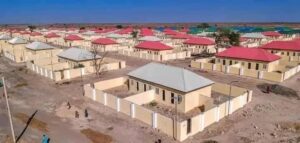Rise in FX poses hardship for real estate sector— Developers
By Owoleye Oluwakayode
The Managing Director, Affordable Housing Limited, Yemi Adelakun, has said the depreciation of the naira would have far reaching impact on real estate.
“Cost of building materials, especially imported ones, will increase and this will be passed on to off-takers as higher prices of real estate.”
Following persisting unfavourable policies and a full-blown foreign exchange rate crisis that has brought Nigeria’s economy to a halt, property developers and experts have warned that real estate sector would be worst hit, if the situation persists.
Apart from the effects on construction cost variations on projects that may force investors to shift completion, a significant part of the nation’s labour force in building and construction industry, mostly artisans from neighbouring countries such as Togo, Benin Republic and Ghana, may leave in droves.
They said this will further compound housing affordability of average Nigerians, whose purchasing power has been eroded by the depreciated value of the naira.
“Also, existing projects may suffer some setbacks including delays or outright project abandonment because of naira depreciation. Similarly, new housing projects will be impacted depending on source and currency of funds. Furthermore, the attraction of real estate investment as a store of value may be impacted negatively by the free fall of naira,” he said.
President, International Real Estate Federation (FIABCI-Nigeria), Mr. Adeniji Adele blamed the crisis on bad implementation of various government policies over the years as a result of double standards and inconsistency.
He said: “The market reacts negatively to the continuing rising exchange rate, which had affected cost of building materials and labour in the built environment. So real estate pricing will never be the same again.
“The market price has gone up, while cost of borrowing is higher and financial institutions are not willing to lend to grow real estate stock as they prefer to advance facilities on short term basis.”
President, Real Estate Developers Association of Nigeria (REDAN), Alhaji Aliyu Wamakko, explained that some building materials are not manufactured locally and any fluctuation in naira will impact on prices in the building materials’ markets.
He heaped the blame on the rise of the foreign exchange rate and inconsistent monetary policies. Wamakko said bureau de change should be allowed to operate side by side with banks.
“It is better to arrest the situation before it goes out of hand,” he said.
The REDAN president, who called for price control board to regulate prices of commodities, foresees an increase in housing prices, if the rise in foreign exchange rate is not checked.
“It is what we put into the buildings, we will sell. It is consumers that it will affect,” Wamakko added.
According to Adele, the housing market may not change substantially as people are already giving up in view of insecurity, unstable monetary policy, lack of attention to the real sector of economy, corruption, high cost of building materials as well as lack of access to land and other bureaucracies from government.
He said: “Government needs to be sincere with the citizens at all levels. The average low-income group may not be able to have access to own homes in the future. Social housing policy should be embedded in the present housing policy, as it is the practice in other developing countries.
“The government should support and encourage private developers to access land at zero cost and work out a model that will be on win -win situation.
“The real estate development would grow if all stakeholders were faithful and upright in the implementation of policies as well as encouraging locally manufactured building materials to further auguments imported and luxury products.”
To ameliorate the impact of foreign exchange fluctuations, Adelakun urged government in the short term to grant subsidies and waivers for affordable housing projects and building materials imports respectively.
“Low interest or no interest housing loan for offtakers will be a welcome intervention. Long-term measures by government to reduce impact of exchange rate fluctuations should include promotion of domestic production of building materials as well as fiscal and monetary policies to stabilise naira,” he added.
Adelakun predicts that the luxury market will continue to thrive.
“Most buyers in this market pay outright for real estate and may indirectly benefit from the depreciating naira by tapping into their dollar reserves. Those pricing luxury real estate may have made provisions for foreign exchange fluctuations.
“Some are priced and paid for in U.S dollars. Price variations may emerge in some new and ongoing projects.mart building developers import their building materials before commencing development to minimise impact of foreign exchange fluctuations.”
However, it should be expected that Nigerians, both at home and in Diaspora, in possession of United States of America dollars would take advantage of naira depreciation to buy existing property stocks before price adjustment.




